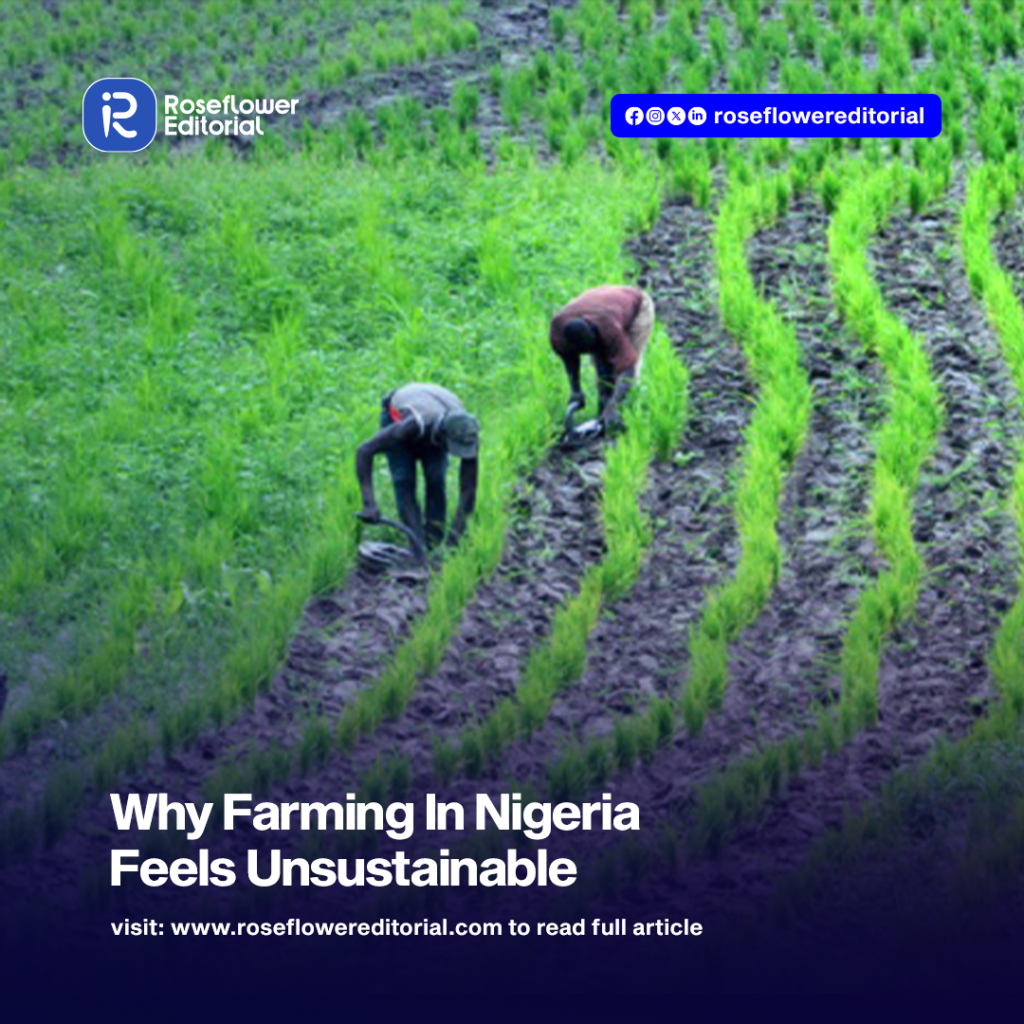
Why Farming in Nigeria Feels Unsustainable
The Alarming Struggles of Nigerian Farmers
Farming has been the backbone of Nigeria’s economy, feeding millions and supporting livelihoods. Yet, with 26.5 million Nigerians projected to face hunger in 2024, the future of agriculture appears increasingly precarious. Rising costs, severe climate conditions, and insecurity are turning this essential trade into a daunting challenge.
Despite its historical significance, farming today feels less like an opportunity and more like a burden for many Nigerian farmers. Is this the grim reality of agriculture in Nigeria, or can we change it?
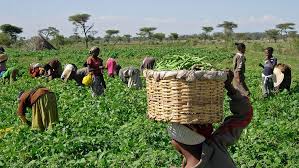
(Photo Reference: People’s Gazette)
Economic Challenges Crippling Nigerian Farmers
As agricultural pioneer Norman Borlaug once said, “The destiny of world civilisation depends upon providing a decent standard of living for all mankind through agriculture.” This rings especially true for Nigeria, where economic hurdles weigh heavily on farmers.
For instance, did you know that fertilizer prices in Nigeria have increased by over 100% in recent years? Combine this with inflation, naira devaluation, and the removal of fuel subsidies, and farming expenses have become nearly unmanageable. Consequently, farmers are spending more on supplies while earning less.
Moreover, the rising costs of transportation and essential materials are leaving many unable to stay afloat. Should Nigeria’s agricultural backbone collapse under these pressures, what would happen to food security?
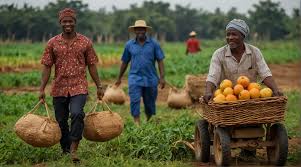
(Photo Reference: Pachamama foods)
Environmental Factors Threatening Nigerian Agriculture
Imagine you’re a farmer, and every planting season feels like gambling with the weather. Would you trust your future to unpredictable rains and searing heat?
Floods in 2023 destroyed 1.3 million hectares of farmland, while droughts in northern Nigeria rendered fields barren. These environmental catastrophes reduce food production and make farming unsustainable for even the most resilient growers.
Adding to this distress, farmers face the dilemma of adapting without resources. While the situation seems dire, perhaps a silver lining is that at least they no longer need to worry about watering crops when the floods come!
The Security Crisis in Farming Communities
Now, picture trying to farm while fearing for your life. Can you focus on tending to crops when bandits roam the fields, kidnappers terrorize communities, and armed conflicts displace families?
These security threats have driven countless Nigerian farmers from their land, leading to food shortages and economic instability. Infrastructure vital to agriculture, like roads and storage facilities, has been destroyed, making it even harder to grow and distribute food.
Until safety is restored to farming communities, agriculture in Nigeria will remain under siege.
Can Farming in Nigeria Be Sustainable Again?
Even in the face of daunting challenges, hope remains. Bold solutions—such as providing government subsidies, promoting modern farming technologies, and addressing climate and security concerns—can reignite the potential of Nigerian agriculture.
But here’s the question: Will Nigeria take the necessary steps to secure its farming future? After all, as the saying goes, “A hungry nation cannot stand.”
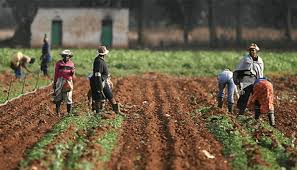
(Photo Reference: Business Day Nigeria)
What Do You Think?
Thank you for reading this article! Now, let’s hear your thoughts:
- Do you believe farming in Nigeria can become sustainable again?
- Which challenge—economic, environmental, or security—do you think is the most urgent to tackle?
- How can individuals like you contribute to supporting Nigerian farmers?
Share your insights and ideas in the comments below, and don’t forget to visit Roseflower Editorial for more thought-provoking content. Together, we can support Nigeria’s agricultural future! Feel free to reach out. Don’t forget to follow us on Instagram, Facebook, and LinkedIn to stay updated and join the conversation. After all, who said farming can’t be fun?
If you missed our previous article on Precision Agriculture, kindly click here.
Written by Emmanuel Ugezene.
Edited, proofread and published by Rhoda Erhabor.
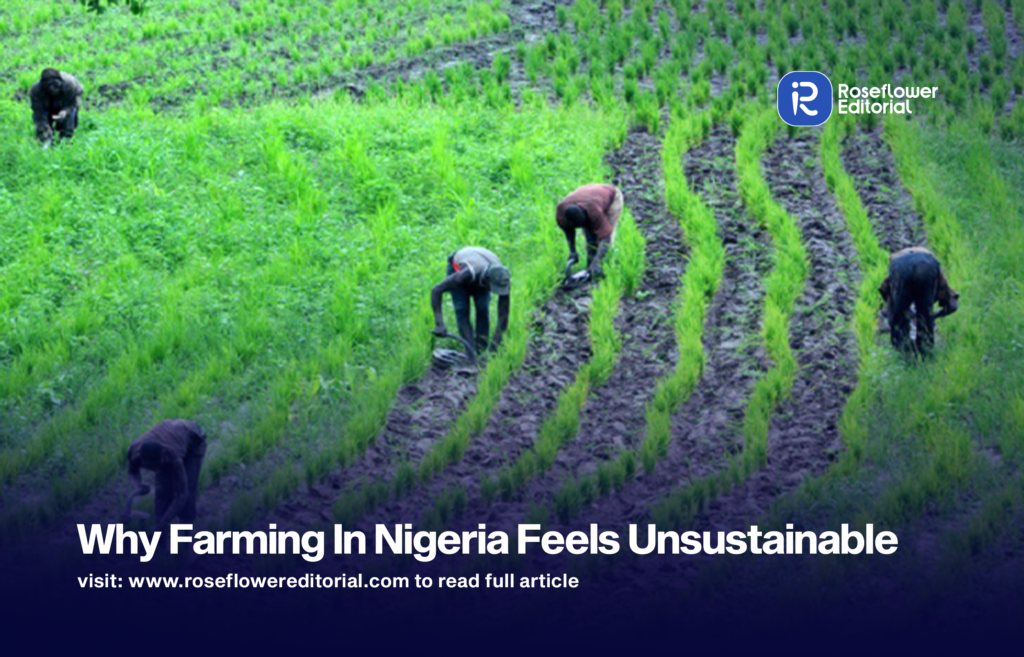












10 Responses
Did you say 6.5 million Nigerians are projected to face hunger in 2024?
This is tough.
Thank you for this article.
Yes, I said so.
The statistics poses threat.
Yes, I believe that farming in Nigeria can be sustainable again.
I love your positivity.
I hope so too.
Adding to this distress, farmers face the dilemma of adapting without resources.
We hope there are antidotes to the farming distress in Nigeria.
Thank you for your response, sir.
This paragraph piqued my interest ” Even in the face of daunting challenges, hope remains. Bold solutions—such as providing government subsidies, promoting modern farming technologies, and addressing climate and security concerns—can reignite the potential of Nigerian agriculture.
Well written article, Emmanuel.
Yes, that’s my favourite paragraph as well. Thank you for your response.
“Did you know that fertiliser prices in Nigeria have increased by over 100% in recent years? ” Now, I know. Your article is insightful and resourceful.
Agriculture in Nigeria has the potential for sustainability, but it must overcome challenges like climate change, soil depletion, and limited access to resources. I just wish we can go back to the days when we planted without fertilizers. There is a topic I would love you to write about. It is the issue of GMOs. I don’t feel right about it. But then, I had a nice time, reading this article. Good job!